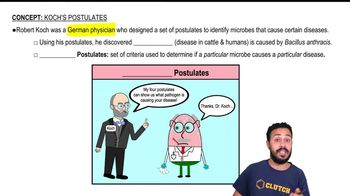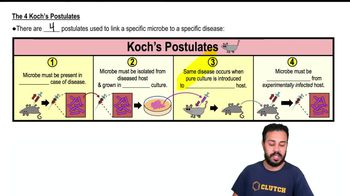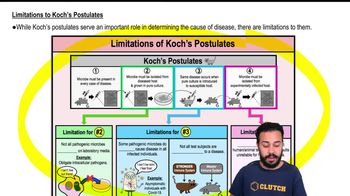21. Principles of Disease
Koch's Postulates
Practice this topic
- Multiple Choice
Chronic wasting disease (CWD) in deer, elk, and moose is caused by a prion. Which of Koch's postulates would not work in regards to identifying the cause of CWD?
- Multiple Choice
Koch stressed the importance of working with ______ to formulate his postulates of disease.
- Multiple Choice
Koch's postulates established:
- Multiple Choice
Which of the following is not one of Koch's postulates?
- Open Question
Which of the following is not one of Koch's postulates?
a. The same pathogen must be present in every case of the disease.
b. The pathogen must be isolated and grown in pure culture from the diseased host.
c. The pathogen from pure culture must cause the disease when inoculated into a healthy, susceptible laboratory animal.
d. The disease must be transmitted from a diseased animal to a healthy, susceptible animal by direct contact.
e. The pathogen must be isolated in pure culture from an experimentally infected lab animal.
- Open Question
Indicate the true statements and then correct the false statements, so they are true.
a. Zoonotic diseases pass from humans to animals.
b. Communicable diseases spread from person to person.
c. Noncommunicable diseases are contagious.
d. Koch’s postulates of disease are mainly used to study noninfectious diseases.
- Open Question
Over time, Koch’s disease postulates have been rephrased in a variety of ways, but they still reflect the same process outlined by Robert Koch. The following are reworded versions of Koch’s postulates. Based on the original postulates, put the following items in the correct order.
a. Use the purified agent to cause infection in a test animal.
b. Isolate an infectious agent from a diseased animal.
c. Grow the infectious agent as a pure culture in the lab.
d. From the test animal, re-isolate the infectious agent that was originally grown in pure culture.
- Open Question
List Koch’s postulates, and explain why they are significant.



